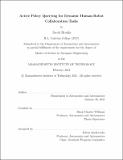| dc.contributor.advisor | Brian Charles Williams. | en_US |
| dc.contributor.author | Broida, Jacob. | en_US |
| dc.contributor.other | Massachusetts Institute of Technology. Department of Aeronautics and Astronautics. | en_US |
| dc.date.accessioned | 2021-05-24T20:22:46Z | |
| dc.date.available | 2021-05-24T20:22:46Z | |
| dc.date.copyright | 2021 | en_US |
| dc.date.issued | 2021 | en_US |
| dc.identifier.uri | https://hdl.handle.net/1721.1/130749 | |
| dc.description | Thesis: S.M. in Aerospace Engineering, Massachusetts Institute of Technology, Department of Aeronautics and Astronautics, February, 2021 | en_US |
| dc.description | Cataloged from the official PDF of thesis. | en_US |
| dc.description | Includes bibliographical references (pages 101-103). | en_US |
| dc.description.abstract | Success in any group task is dependent upon mutual understanding between the collaborators. Team members can use observation to infer their partner's plans, but such an approach carries great uncertainty and requires passive collaboration. For robots working alongside humans, verbal communication, especially in the form of questions, can provide definite and preemptive knowledge of a partner's policy. This knowledge in turn allows the robot to adapt its own plans to maximize team success. To that end, we propose a model and algorithms that will allow a robotic teammate to efficiently select the optimal questions to ask its partner in order to maximize the chances of team success. Our algorithms utilize decision graphs to compactly represent the policy space of team tasks. Using this compact representation, we are able to develop fast and efficient methods for determining the optimal set of questions. We exhibit four algorithms, one each for pre-execution questions, single scheduled questions, and multiple scheduled questions, and questions in tasks with communication restrictions. We show in experimental trials that these algorithm are capable of raising the success rate of a team task by up to 400% of the original value in typical scenarios. | en_US |
| dc.description.statementofresponsibility | by Jacob Broida. | en_US |
| dc.format.extent | 122 pages | en_US |
| dc.language.iso | eng | en_US |
| dc.publisher | Massachusetts Institute of Technology | en_US |
| dc.rights | MIT theses may be protected by copyright. Please reuse MIT thesis content according to the MIT Libraries Permissions Policy, which is available through the URL provided. | en_US |
| dc.rights.uri | http://dspace.mit.edu/handle/1721.1/7582 | en_US |
| dc.subject | Aeronautics and Astronautics. | en_US |
| dc.title | Active policy querying for dynamic human-robot collaboration tasks | en_US |
| dc.type | Thesis | en_US |
| dc.description.degree | S.M. in Aerospace Engineering | en_US |
| dc.contributor.department | Massachusetts Institute of Technology. Department of Aeronautics and Astronautics | en_US |
| dc.identifier.oclc | 1251896767 | en_US |
| dc.description.collection | S.M.inAerospaceEngineering Massachusetts Institute of Technology, Department of Aeronautics and Astronautics | en_US |
| dspace.imported | 2021-05-24T20:22:46Z | en_US |
| mit.thesis.degree | Master | en_US |
| mit.thesis.department | Aero | en_US |
